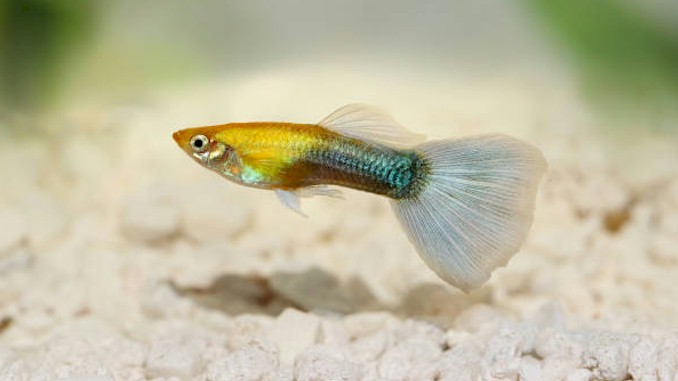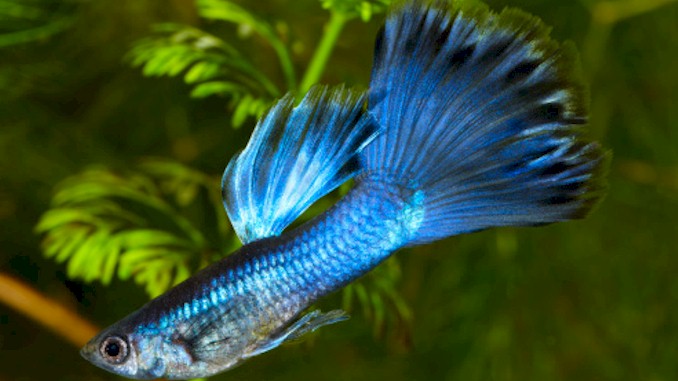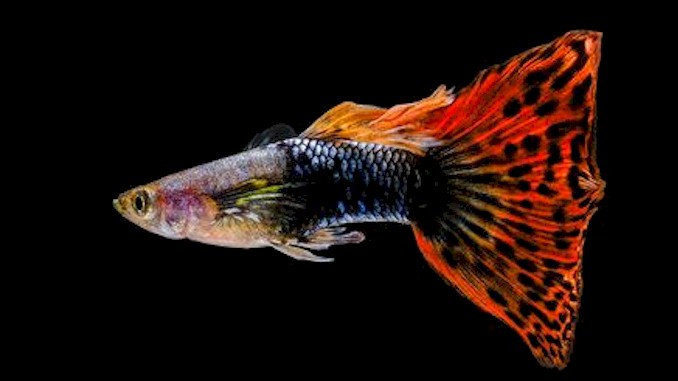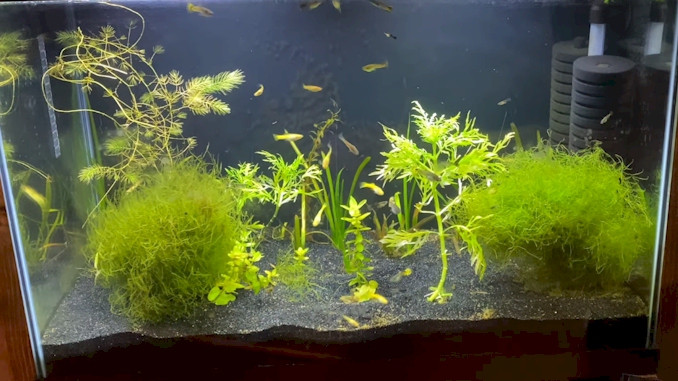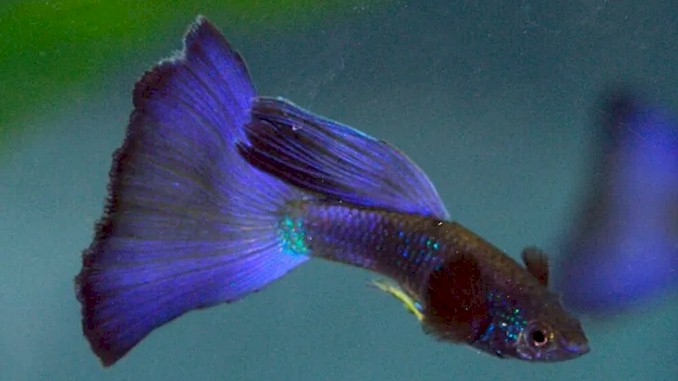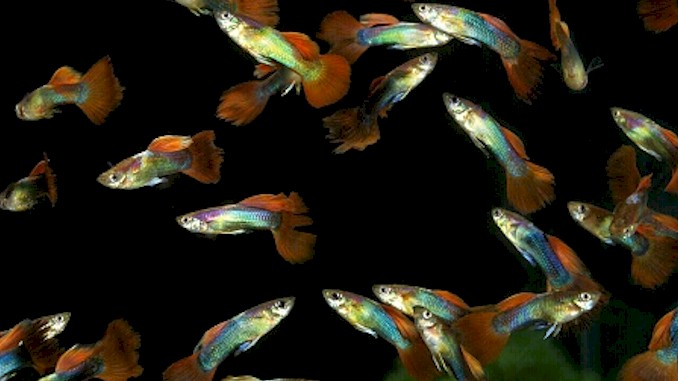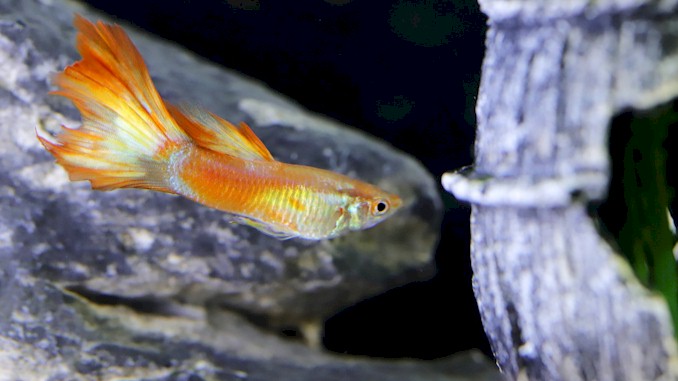White Poop in Guppies: What You Need to Know
As an experienced aquarist, I understand the concerns that arise when your guppy begins to display abnormal behavior. One of the most common issues that pet owners face is observing white poop in their guppy’s aquarium. White poop in guppies can be a cause for concern as it could indicate underlying health problems. But don’t worry, as an expert in fish health and nutrition, I’m here to provide you with the answers and guide you through the necessary steps to ensure your guppy is healthy and happy. In this blog post, I will explain why your guppy may be producing white poop, what you can do to remedy the situation, and when you should seek professional help.
White poop in guppies is often a sign of an internal bacterial infection or a digestive problem. The white color comes from excess mucus, which is produced in response to the irritation. If left untreated, this condition can lead to severe health problems and even death. It is essential to identify the underlying cause of white poop in guppies to provide the proper treatment.
Now you have known some basic information about why your guppy may be producing white poop and what you can do about it. However, there’s more to this topic that you should know to keep your guppies healthy and thriving. In the following sections, I’ll delve deeper into the causes of white poop in guppies, the most effective remedies, and how you can prevent this condition from occurring in the first place. So keep reading to gain a more comprehensive understanding of this issue and become a more knowledgeable and confident guppy owner.
What are the possible causes of white poop in guppies?
White poop in guppies can be caused by a variety of factors, including old age, inappropriate diet, intestinal infection, stress, and poor water quality. Let’s take a closer look at each of these possible causes.
Old age: As guppies age, their digestive systems may become less efficient, leading to changes in their bowel movements. If your guppy is displaying other signs of aging, such as slower movement or decreased appetite, white poop may simply be a result of the natural aging process.
Inappropriate diet: Guppies require a well-balanced diet that includes both protein and plant matter. If your guppy’s diet is lacking in essential nutrients, or if they are consuming too much of one type of food, their digestive system may become unbalanced, leading to white poop. Additionally, feeding your guppy foods that are high in fat or oil can also cause white poop.
Intestinal infection: Bacterial or parasitic infections can cause inflammation of the intestinal tract, leading to excess mucus production and white poop. If your guppy is displaying other symptoms of illness, such as lethargy, loss of appetite, or unusual behavior, it may be a sign of an infection that requires treatment.
Stress: Stress can be a significant cause of white poop in guppies. Stress can arise from changes in their environment, such as a sudden change in water temperature or pH, overcrowding in their tank, or exposure to aggressive tank mates. When guppies become stressed, they may produce excess mucus, resulting in white poop.
Poor water quality: Poor water quality is a common cause of many fish health problems, including white poop. High levels of ammonia, nitrite, or nitrate can irritate the intestinal tract and cause excess mucus production. Additionally, if the water is too warm or too cold, this can also lead to digestive problems and white poop.
As you see, white poop in guppies can be caused by a variety of factors, including old age, inappropriate diet, intestinal infection, stress, and poor water quality. Identifying the cause of white poop is crucial to providing the appropriate treatment and ensuring the health and well-being of your guppies. In the next section, I will talk about how to diagnose white poop in your guppies.
How can you diagnose white poop in your guppy?
Diagnosing white poop in your guppy requires careful observation and an understanding of your guppy’s typical behavior and bowel movements. Here are some steps you can take to diagnose white poop in your guppy:
- Observe your guppy’s bowel movements: Regularly monitoring your guppy’s bowel movements is crucial to detecting any changes in their stool color or consistency. Healthy guppy poop should be dark brown to black in color and have a solid, cylindrical shape. If you notice white or pale-colored stool, this is a sign of white poop.
- Look for other signs of illness: White poop can be a symptom of an underlying health issue, so it’s important to watch for other signs of illness in your guppy. These may include lethargy, loss of appetite, abnormal swimming behavior, or visible signs of infection, such as redness or swelling.
- Check your water parameters: As mentioned earlier, poor water quality can contribute to white poop in guppies. Regularly testing your water parameters for levels of ammonia, nitrite, nitrate, and pH can help you identify if poor water quality is contributing to your guppy’s white poop.
- Review your guppy’s diet: Your guppy’s diet can also play a significant role in their digestive health. Take a close look at what you are feeding your guppy and how much you are feeding them. If your guppy’s diet is lacking in essential nutrients, this can cause digestive problems and white poop.
- Consider any recent changes to the tank: Changes to your guppy’s environment can also cause stress and digestive issues. Consider if any recent changes have been made to your guppy’s tank, such as a change in water temperature, pH, or the addition of new tank mates.
Diagnosing white poop in your guppy requires careful observation, consideration of other symptoms of illness, review of water parameters and diet, and awareness of any recent changes to the tank environment. Once you have identified the cause of your guppy’s white poop, you can take steps to remedy the issue and ensure your guppy stays healthy and happy. In the next section, we will explore the most effective remedies for white poop in guppies.
How to Treat Guppies With White Poop
After you have identified the causes according to the suggestions I described above, it’s time to try to treat your guppies with the proper solution, for instance:
Treating Intestinal Parasites
If you suspect that your guppy is suffering from Capillaria and/or Hexamita, it is crucial to seek professional help from a veterinarian. They are experts in treating such diseases without harming your fish. However, if you are determined to tackle the illness yourself, make sure to quarantine your guppy first, especially if you are not confident with your diagnosis.
Remember, you do not want to risk infecting other fish in your community tank. Once the sick guppy is isolated, you can start the treatment process. One of the most common treatments for intestinal parasites is Metronidazole, and Albendazole is another option.
Another helpful method is to treat the water using Parinox. If these terms sound unfamiliar, consider using Seachem ParaGuard, a safe and effective product that can work wonders against a range of parasites.
In some cases, a veterinarian may advise raising the temperature by a few degrees and treating your guppy to an Epsom salt bath. However, if your guppy’s condition is severe, products like Metronidazole may be the only practical solution.
It is also important to implement simple solutions while waiting for your remedy to arrive. For instance, isolate your sick guppy in a hospital tank and raise the temperature to two degrees higher than the original tank. Add only one tablespoon of API Aquarium Salt for each gallon of water in the hospital tank to avoid dehydrating your guppy further. With these measures, you can help your guppy recover and prevent the spread of parasites to other fish in your tank.
Ensure High Water Quality
When your guppy falls ill, the first step in ensuring its recovery is to test the water quality in its tank. A poorly maintained tank can either cause illness or worsen existing symptoms. Therefore, it’s crucial to maintain the right pH levels (between 7.0-7.2) and temperature (between 75-82 degrees F).
To accurately measure the pH, ammonia, nitrates, and nitrites in your tank, you may consider purchasing the API Aquarium Test Kit. This must-have and affordable bundle will help you keep the water parameters in check, which is essential for preventing many illnesses.
If you find that the pH or toxins are out of the desired range, it’s recommended to perform more frequent water changes. Replace at least 15-20% of the water weekly and even more if the tank is relatively crowded or the parameters are dangerously high.
By maintaining optimal water quality, you can increase your guppy’s chances of survival and recovery. So, always be vigilant and test your water regularly to ensure a healthy and thriving environment for your aquatic pets.
Feeding Schedule and Amounts
Keeping your guppies well-fed and healthy can be a challenge, but it’s essential to ensure their survival. Overfeeding is a common mistake that can lead to water contamination and other health problems. To prevent this, control the amount of food you give your guppies. A good rule of thumb is to offer them only what they can consume in two minutes. Any leftovers could contribute to toxic build-up in the tank.
It’s also important to stick to a regular feeding schedule, preferably once or twice a day. Guppies might beg for more food, but don’t be tempted to give in. Overfeeding can cause health issues, just as underfeeding can. To avoid missing a feeding time, consider investing in an automatic feeder like the Eheim Automatic Feeding Unit. This device can help you maintain a regular feeding schedule, even if you have a busy lifestyle.
To keep your guppies healthy, provide them with a balanced diet that includes flakes, pellets, live and frozen foods, and vegetables. As omnivores, they require a variety of foods to thrive. If your guppy is constipated, try feeding them a few peeled peas. If overfeeding is the cause, fast them for a few days before adding peas to their diet.
In summary, maintaining a proper feeding schedule and providing a balanced diet is crucial for the health and longevity of your guppies. By controlling the amount of food you offer, sticking to a regular feeding schedule, and providing a variety of foods, you can help your guppies thrive.
Mitigate Stress
Stress in your tank can exacerbate the white stringy poop problem, so it’s important to mitigate any factors that may cause your guppies to feel stressed. A great way to start is by adding plants and decorations to the tank.
Creating hiding spots for your guppies will give them a chance to avoid any aggressive or territorial fish, which can help them feel more relaxed and less stressed. This, in turn, can make it easier for them to maintain a healthy diet.
However, it’s essential to ensure that you don’t overcrowd your tank, as too many fish can lead to more stress and aggression. Additionally, avoid introducing aggressive fish like cichlids, which are known to chase and nip at guppies.
How can you prevent white poop in guppies from occurring in the first place?
Prevention is always better than cure, and the same is true when it comes to white poop in guppies. Here are some steps you can take to prevent white poop from occurring in the first place:
- Provide a balanced diet: A well-balanced diet is essential for your guppy’s digestive health. Feed your guppy a variety of high-quality commercial foods and supplement their diet with live or frozen foods like brine shrimp or bloodworms. Avoid overfeeding and feeding your guppy too many treats.
- Keep the tank clean: Regularly clean your guppy’s tank and perform partial water changes to maintain good water quality. Use a gravel siphon to remove any uneaten food or waste from the substrate.
- Avoid overcrowding: Overcrowding can lead to poor water quality, stress, and an increased risk of disease. Make sure your guppy has plenty of space to swim and avoid keeping too many fish in one tank.
- Quarantine new fish: Before introducing new fish to your guppy’s tank, quarantine them in a separate tank for a few weeks to ensure they are not carrying any diseases or parasites that could infect your guppy.
- Maintain proper water parameters: Guppies thrive in water with a pH between 7.0-8.0 and a temperature between 75-82°F. Use a reliable aquarium thermometer and test your water parameters regularly to ensure they are within the appropriate range.
By following these steps, you can help prevent white poop from occurring in your guppies. A healthy diet, clean tank, appropriate stocking density, quarantine of new fish, and proper water parameters can all contribute to a healthy and happy guppy.
When should you seek professional help for white poop in guppies?
While white poop in guppies can sometimes be treated at home, there are situations where it is best to seek professional help. Here are some signs that it is time to seek help from a veterinarian or aquatic specialist:
- The condition does not improve: If your guppy’s white poop does not improve after a week of home treatment, it may be time to seek professional help.
- Other symptoms appear: If your guppy displays other symptoms, such as lethargy, loss of appetite, or abnormal swimming behavior, it is best to seek professional help as these can be signs of a more serious condition.
- Multiple fish are affected: If multiple fish in your tank are showing signs of white poop or other symptoms, it may indicate an outbreak of disease and you should seek professional help.
- You are unsure of the cause: If you are unsure of the cause of your guppy’s white poop, or if it is accompanied by other symptoms that you are unable to diagnose or treat at home, seek professional help.
- You are inexperienced: If you are new to aquarium keeping or have limited experience treating fish diseases, it is best to seek professional help to ensure your guppy receives the proper treatment.
When seeking professional help, look for a veterinarian or aquatic specialist with experience in treating fish diseases. Bring a sample of your tank water for testing, and be prepared to provide information about your guppy’s diet, tank conditions, and any symptoms they are displaying.
In conclusion, while home treatment can be effective for white poop in guppies in many cases, there are situations where seeking professional help is necessary. Keep an eye out for any other symptoms, and don’t hesitate to seek help if you are unsure of the cause or have limited experience in treating fish diseases.
Pregnant Guppies With White Stringy Poop
If you have a pregnant guppy in your aquarium and you notice a white stringy substance hanging from its tail, it is highly likely that the fish has a parasite. This could happen due to the introduction of new fish to the tank or because the aquarium’s conditions have deteriorated.
To ensure the well-being of your pregnant guppy and a safe delivery, you should first ensure that the tank is spacious enough, has a heater and a filter, and is well-maintained. It is also recommended to use a testing kit to check the levels of ammonia, nitrates, and nitrites in the water.
Adding vegetation to the tank can provide a safe space for the newborn fry as pregnant guppies tend to eat their offspring. It is also a good idea to add a few plants or decorations to create hiding spots for the newborns.
However, it’s important to note that pregnant guppies can also release a white substance due to their pregnancy, but in this case, it won’t be stringy. Instead, it will float in the water. It’s crucial to ensure that it isn’t worms.
If the white substance is still and doesn’t show any movements, and your guppy appears healthy, you may leave things as they are. But, if you notice gentle movements, you should isolate the pregnant guppy and seek veterinary advice for the proper medication to treat the worms.
What Color Should Guppy Poop Be
Healthy guppy poop should be brown in color and have a solid, cylindrical shape. The size of the poop may vary depending on the size of the fish, but it should generally be proportional to their body size. It’s normal for guppies to produce some waste, but excessive or abnormal poop can be a sign of underlying health issues.
Conclusion
If your guppy is pooping white matter, you should consider a parasitic infection first. The best action here would be isolating the potentially sick guppy and treating it accordingly. You may start with temperature elevation and salt. Then, consult a vet for further remedies.
I also encourage you to improve your tank’s conditions. For example, measure the water pH, and check for toxins such as ammonia, nitrates, and nitrites. You may also remove aggressive tank mates so your guppies won’t be susceptible to diseases in the long haul.

